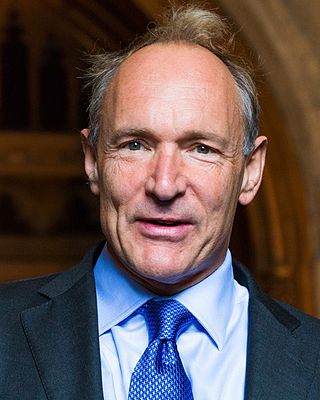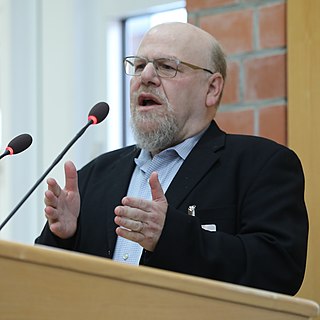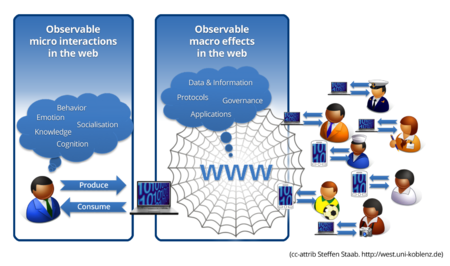The Association for Computing Machinery (ACM) is a US-based international learned society for computing. It was founded in 1947 and is the world's largest scientific and educational computing society. The ACM is a non-profit professional membership group, reporting nearly 110,000 student and professional members as of 2022. Its headquarters are in New York City.

Frederick Phillips Brooks Jr. was an American computer architect, software engineer, and computer scientist, best known for managing the development of IBM's System/360 family of computers and the OS/360 software support package, then later writing candidly about those experiences in his seminal book The Mythical Man-Month.

Sir Timothy John Berners-Lee, also known as TimBL, is an English computer scientist best known as the inventor of the World Wide Web, the HTML markup language, the URL system, and HTTP. He is a professorial research fellow at the University of Oxford and a professor emeritus at the Massachusetts Institute of Technology (MIT).

Theodor Holm Nelson is an American pioneer of information technology, philosopher, and sociologist. He coined the terms hypertext and hypermedia in 1963 and published them in 1965. According to a 1997 Forbes profile, Nelson "sees himself as a literary romantic, like a Cyrano de Bergerac, or 'the Orson Welles of software'."

The following outline is provided as an overview of and topical guide to academic disciplines:
The following outline is provided as an overview of and topical guide to human–computer interaction:

Ben Shneiderman is an American computer scientist, a Distinguished University Professor in the University of Maryland Department of Computer Science, which is part of the University of Maryland College of Computer, Mathematical, and Natural Sciences at the University of Maryland, College Park, and the founding director (1983-2000) of the University of Maryland Human-Computer Interaction Lab. He conducted fundamental research in the field of human–computer interaction, developing new ideas, methods, and tools such as the direct manipulation interface, and his eight rules of design.

James Alexander Hendler is an artificial intelligence researcher at Rensselaer Polytechnic Institute, United States, and one of the originators of the Semantic Web. He is a Fellow of the National Academy of Public Administration.
Andrew Sears is an American computer scientist. He is a professor and dean of the College of Information Sciences and Technology (IST) at The Pennsylvania State University.

The Web Science Trust (WST) is a UK Charitable Trust with the aim of supporting the global development of Web science. It was originally started in 2006 as a joint effort between MIT and University of Southampton to formalise the social and technical aspects of the World Wide Web. The trust coordinates a set of international "WSTNet Laboratories" that include academic research groups in the emerging area of Web science.
Christine L. Borgman is Distinguished Professor and Presidential Chair in Information Studies at UCLA. She is the author of more than 200 publications in the fields of information studies, computer science, and communication. Two of her sole-authored monographs, Scholarship in the Digital Age: Information, Infrastructure, and the Internet and From Gutenberg to the Global Information Infrastructure: Access to Information in a Networked World, have won the Best Information Science Book of the Year award from the American Society for Information Science and Technology. She is a lead investigator for the Center for Embedded Networked Sensing (CENS), a National Science Foundation Science and Technology Center, where she conducts data practices research. She chaired the Task Force on Cyberlearning for the NSF, whose report, Fostering Learning in the Networked World, was released in July 2008. Prof. Borgman is a Fellow of the American Association for the Advancement of Science (AAAS), a Legacy Laureate of the University of Pittsburgh, and is the 2011 recipient of the Paul Evan Peters Award from the Coalition for Networked Information, Association for Research Libraries, and EDUCAUSE. The award recognizes notable, lasting achievements in the creation and innovative use of information resources and services that advance scholarship and intellectual productivity through communication networks. She is also the 2011 recipient of the Research in Information Science Award from the American Association of Information Science and Technology. In 2013, she became a fellow of the Association for Computing Machinery.

The Human–Computer Interaction Lab (HCIL) at the University of Maryland, College Park is an academic research center specializing in the field of human-computer interaction (HCI). Founded in 1983 by Ben Shneiderman, it is one of the oldest HCI labs of its kind. The HCIL conducts research on the design, implementation, and evaluation of computer interface technologies. Additional research focuses on the development of user interfaces and design methods. Primary activities of the HCIL include collaborative research, publication and the sponsorship of open houses, workshops and annual symposiums.

Dame Wendy Hall is a British computer scientist. She is Regius Professor of Computer Science at the University of Southampton.

Sir Nigel Richard Shadbolt is Principal of Jesus College, Oxford, and Professorial Research Fellow in the Department of Computer Science, University of Oxford. He is chairman of the Open Data Institute which he co-founded with Tim Berners-Lee. He is also a visiting professor in the School of Electronics and Computer Science at the University of Southampton. Shadbolt is an interdisciplinary researcher, policy expert and commentator. His research focuses on understanding how intelligent behaviour is embodied and emerges in humans, machines and, most recently, on the Web, and has made contributions to the fields of Psychology, Cognitive science, Computational neuroscience, Artificial Intelligence (AI), Computer science and the emerging field of Web science.
Knowledge retrieval seeks to return information in a structured form, consistent with human cognitive processes as opposed to simple lists of data items. It draws on a range of fields including epistemology, cognitive psychology, cognitive neuroscience, logic and inference, machine learning and knowledge discovery, linguistics, and information technology.
Informatics is the study of computational systems. According to the ACM Europe Council and Informatics Europe, informatics is synonymous with computer science and computing as a profession, in which the central notion is transformation of information. In other countries, the term "informatics" is used with a different meaning in the context of library science, in which case it is synonymous with data storage and retrieval.

David Charles De Roure is an English computer scientist who is a professor of e-Research at the University of Oxford, where he is responsible for Digital Humanities in The Oxford Research Centre in the Humanities (TORCH), and is a Turing Fellow at The Alan Turing Institute. He is a supernumerary Fellow of Wolfson College, Oxford, and Oxford Martin School Senior Alumni Fellow.

NodeXL is a network analysis and visualization software package for Microsoft Excel 2007/2010/2013/2016. The package is similar to other network visualization tools such as Pajek, UCINet, and Gephi. It is widely applied in ring, mapping of vertex and edge, and customizable visual attributes and tags. NodeXL enables researchers to undertake social network analysis work metrics such as centrality, degree, and clustering, as well as monitor relational data and describe the overall relational network structure. When applied to Twitter data analysis, it showed the total network of all users participating in public discussion and its internal structure through data mining. It allows social Network analysis (SNA) to emphasize the relationships rather than the isolated individuals or organizations, allowing interested parties to investigate the two-way dialogue between organizations and the public. SNA also provides a flexible measurement system and parameter selection to confirm the influential nodes in the network, such as in-degree and out-degree centrality. The software contains network visualization, social network analysis features, access to social media network data importers, advanced network metrics, and automation.
Health Web Science (HWS) is a sub-discipline of Web Science that examines the interplay between health sciences, health and well-being, and the World Wide Web. It assumes that each domain influences the others. HWS thus complements and overlaps with Medicine 2.0. Research has uncovered emergent properties that arise as individuals interact with each other, with healthcare providers and with the Web itself.

Daniel J. Weitzner is the director of the MIT Internet Policy Research Initiative and principal research scientist at the Computer Science and Artificial Intelligence Lab CSAIL. He teaches Internet public policy in MIT's Computer Science Department. His research includes development of accountable systems architectures to enable the Web to be more responsive to policy requirements.












